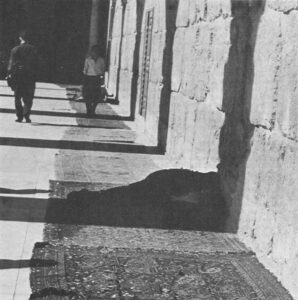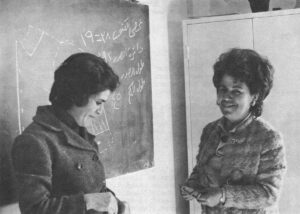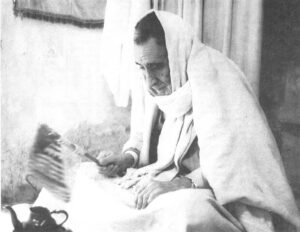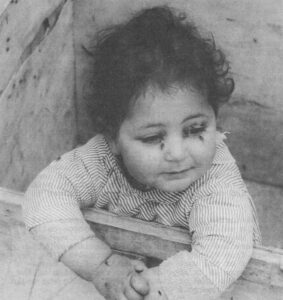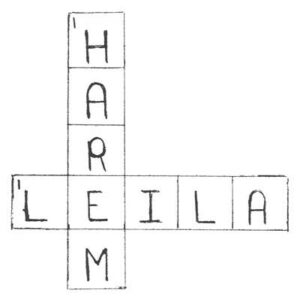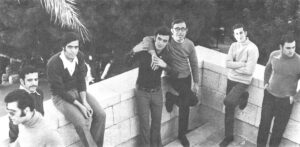“The major problem in Israeli society has nothing to do with the Arabs and Jews or Oriental and Western Jews: it is the Orthodox Jews and the rest of us,” a Jerusalemite, a Jew, recently declared. Although only twelve percent of the population is Orthodox – Jews who strictly and literally follow the spiritual traditions of their forefathers, every Israeli falls under the jurisdiction of the Orthodox whose courts adjudicate all Israeli law pertaining to personal matters.
“There are lots of Israelis who feel uneasy with fundamentalist religion but who still think Shabbath should not be only for going to the beach,” according to Dr. Ezra Spicehandler, Proctor of the Hebrew Union College – Jerusalem Branch, an affiliate of the American Reform Jewish movement, which came to Israel after traveling to America from Germany where it developed during the Nineteenth Century German Jewish Enlightenment. Reform Judaism attempts to relate historical Judaism to modern Israeli life and tries to appeal to the non-Orthodox majority of Israelis.
American-style Reform Judaism – what Israelis call Progressive Judaism, however, is not catching on in Israel as fast as other American imports like Coca-Cola and Phantom jets. Some blame retardation of Progressive Judaism’s growth on opposition of Orthodoxy, which believes Progressive Judaism tampers dangerously with tradition. The bloc of religious (Orthodox) political parties in Israel’s Government coalition is in a strategic position to harass Progressive Judaism. At last year’s Labor Party convention, for example, the coalition-conscious steering committee tabled a proposal to give equal rights to all Jewish dominations – Reform, Conservative, and Orthodox. A probable majority favored the proposal.
Mr. Zev Gotthold, who is Director of the Department for Contact with the Diaspora in the Ministry for Religious Affairs and – as he put it – Foreign minister for the religious establishment, is in a position to talk about American-imported Reform and the Orthodox boycott.
“Why not call the baby by its name?” declared Mr. Gotthold. “Progressive Judaism is simply Reform. We fear that somehow not only in name but also in presentation, this brand of Judaism is American.” He continued, “If it is a matter of policy for Reform American rabbis to fight for American comfort in religion and recognition in Israel, they are barking up the wrong tree. In religion as such,” he said, “there is nothing progressive.”
Mr. Gotthold elaborated, “This is not discrimination against Progressive rabbis, or Americans, or Reform here. It’s against those not authorized in compliance with Israeli law no matter how long or short his beard is.”
The Israeli law to which Mr. Gotthold refers is Halachic law, traditional oral interpretations of the laws in the divinely revealed Bible which Orthodox Jews insist should apply to any and every given situation in man’s life.
Dr. Spicehandler had reported that Israel’s Orthodox authorities refuse to license Progressive rabbis to perform marriage, funeral, circumcision, conversion, and other rites. He said that the reason the Orthodox officials give is that the rabbis are not “competent.”
Mr. Gotthold, however, insisted that “What little training they [Progressive rabbis] receive, they practice.” But he made a “distinction between ritual ceremonies and valid legal transactions.” He admitted that while “they can take part in a ceremony” they are not qualified in Halachic law and thus not “authorized by the State to act as its representative.” He boiled it down to a matter of “law and order; he [the rabbi] must abide by these laws.”
Recently public controversy surrounded Orthodoxy’s rejection of a Jew’s conversion by a Progressive rabbi. The Government finally compromised saying it will recognize conversions performed by these rabbis if abroad; it will accept these converted Jews and repatriate them under the basic Zionist Law of Return that grants automatic citizenship to every Jew immigrating to Israel. However, the Orthodox still refusing to recognize these people as Jews, decline to marry Progressive converts to certified Jews.
Despite these incidents, Hebrew Union College Proctor Spicehandler considers Orthodox Judaism’s opposition only a “nuisance.” The major problem, he said, is the feeling among Israelis that Progressive Judaism is somehow foreign. He quipped, “Lots of people call the Hebrew Union College, which neighbors American tourists’ favorite hotel, The King David, the hotel chapel.”
Indeed Progressive Judaism is imported. But, some dissenters point out, so is everything else in Israel, the homeland for Jews who spent milleniums in Diaspora.
Dr. Spicehandler emphasized that Progressive Judaism’s alien status in Israel is because “liberal religion does not exist in the conceptual world of the Israeli. The typical Israeli connects religion with old-fashioned fundamentalism, and he either likes it or rejects it.”
He explained why: “Most Israelis come from countries where there was no liberal Christianity; religion was medieval, backward.” It is the same for immigrants from Muslim countries. If you happened to be a liberal thinking Jew in those countries, then you would no longer practice Judaism. No alternate compromise in terms of religion existed.
“For Polish Jews if Darwin is right, then how can you pray?” is the way the typical, secular Israeli sees things, according to Spicehandler. But, he added, “At certain times like when a father dies or a daughter marries, the Israeli who has not gone to synagogue in years takes off the brakes in his emotional life.” He returns to the only thing he knows: Orthodox Judaism.
“Where it [Orthodox opposition] hurts,” said Spicehandler, “is in the financial side of it.” “But,” he added, “maybe it is not good for the Reform Movement to support religion’s being a state matter.”
“There is a trend toward separation of Halacha from State,” admitted Mr. Gotthold from the Ministry for Religious Affairs. “But,” he insisted, “that doesn’t have anything to do with Progressive Judaism.”
Although Progressive Judaism attracted on the Jewish High Holidays – Rosh HaShanah (New Year) and Yom Kippur (Day of Atonement) – no more than three thousand worshippers out of a Jewish population of more than two and one-half million, the movement may have potential allies among the non-Orthodox Israelis wanting to curb Orthodoxy’s legally sanctioned interference in personal affairs.
For several years the Progressives have been conducting a dialogue on the subject of religious alternatives with the Conservative and Reconstructionist Movements, with a group called Mevakshei Derekh (Seekers of a Path), and with some Labor and Mapam party affiliated kibbutzim.
Plus there are individuals like the Jerusalemite who expressed his resentment toward Orthodoxy but also confided, “I feel like I was deprived of something and don’t want my children to be deprived of it. Maybe my parents who were atheist socialists and who were making a revolution didn’t need what I need. But Israel is through with the revolution and left with the material products.”
He could imagine himself attending a Progressive service, which differs from the Orthodox service to the degree that musical ensembles and choirs are often employed. And since he expressed a desire to retain some traditions-symbols and rituals – from his Jewish heritage, he probably would appreciate seeing the Israeli Progressive Jews donning yarmulkes and prayer shawls, a practice rejected by their American Reform comrades.
Received in New York on December 23, 1971.
©1971 Paula Stern
Paula Stern, a free-lance writer, is an Alicia Patterson Fund award winner. This article may be published with credit to Ms. Stern and the Alicia Patterson Fund.

